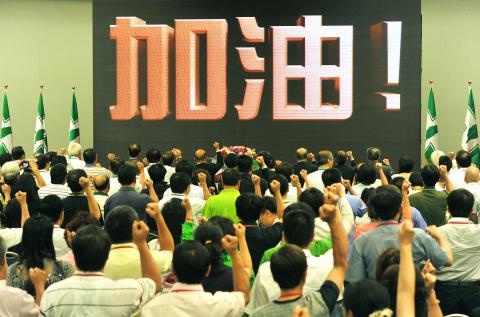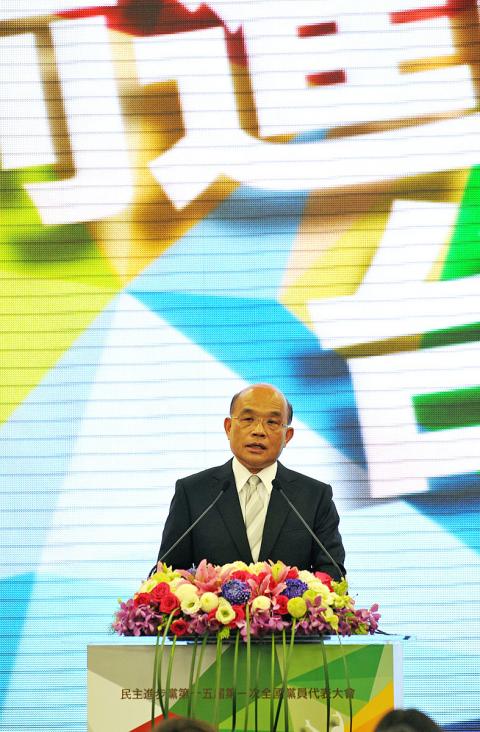Former premiers Frank Hsieh (謝長廷) and Yu Shyi-kun, along with the former New Tide faction, the most powerful grouping in the Democratic Progressive Party (DPP), came away victorious last night in elections that will shape the party for the next two years.
The two political heavyweights were elected to the 10-person Central Standing Committee (CSC), the party’s top decisionmaking and administrative body. Three members of the New Tide faction — Tuan Yi-kang (段宜康), Yen Hsiao-ching (顏曉菁) and Rosalia Wu (吳思瑤) — were also voted onto CSC.
The two former premiers’ “factions” also did well, with Kuan Bi-ling (管碧玲) of the Hsieh faction and Chen Ting-fei (陳亭妃) of the Yu faction also elected to the committee.

Photo: Chien Jung-fong, Taipei Times
Biennial elections for new members of the CSC, the Central Executive Committee (CEC) and the Central Review Committee, which oversees the party’s internal affairs, were held at the party’s annual national congress yesterday. The event marked a changing of the guard in the DPP after Su Tseng-chang (蘇貞昌) became party chairman in May.
Thirty Central Executive Committee members were selected from 560 party representatives to make the final nominee list, before the newly elected CEC members cast their votes to elect the CSC members.
The CSC is comprised of 17 members: the 10 elected members — which also included Tsai Hsien-hao (蔡憲浩), Ho Chih-wei (何志偉) and Lee Ching-fu (李清福) — along with seven members designated by the chairperson, three DPP legislative caucus executives and three mayors.

Photo: Chien Jung-fong, Taipei Times
Former DPP legislator Chai Trong-rong (蔡同榮) failed to win a draw and so lost the opportunity to retain his CSC seat. He had been tied with Wu and Yen, who had two votes each.
The results of the Central Executive Committee election yielded a balanced power-sharing structure between the now disbanded factions, with New Tide winning seven seats, closely followed by Yu’s faction, with six seats, Hsieh’s faction with five and the Su Tseng-chang faction with four. The Green Friendship Alliance and Greater Kaohsiung Mayor Chen Chu’s (陳菊) faction tied with two seats apiece.
The biggest surprise in the Central Executive Committee election was the loss of Deputy Kaohsiung Mayor Liu Shih-fang (劉世芳), who lost by one vote.
The party posts are the only occasion within the DPP where factions can compete for power, which is why they are vociferously contested and produce rumors of vote-buying and other allegations of cheating.
Most DPP heavyweights, including Hsieh and Yu, played down the rumors, with Hsieh saying that such allegations were made in nearly every DPP election.
Eleven Central Review Committee members were also elected at the annual congress.

ACTION PLAN: Taiwan would expand procurement from the US and encourage more companies to invest in the US to deepen bilateral cooperation, Lai said The government would not impose reciprocal tariffs in retaliation against US levies, President William Lai (賴清德) said yesterday, as he announced five strategies to address the issue, including pledging to increase Taiwanese companies’ investments in the US. Lai has in the past few days met with administrative and national security officials, as well as representatives from various industries, to explore countermeasures after US President Donald Trump on Wednesday last week announced a 32 percent duty on Taiwanese imports. In a video released yesterday evening, Lai said that Taiwan would not retaliate against the US with higher tariffs and Taiwanese companies’ commitments to

Intelligence agents have recorded 510,000 instances of “controversial information” being spread online by the Chinese Communist Party (CCP) so far this year, the National Security Bureau (NSB) said in a report yesterday, as it warned of artificial intelligence (AI) being employed to generate destabilizing misinformation. The bureau submitted a written report to the Legislative Yuan in preparation for National Security Bureau Director-General Tsai Ming-yen’s (蔡明彥) appearance before the Foreign Affairs and National Defense Committee today. The CCP has been using cognitive warfare to divide Taiwanese society by commenting on controversial issues such as Taiwan Semiconductor Manufacturing Co’s (TSMC, 台積電) investments in the

HELPING HAND: The steering committee of the National Stabilization Fund is expected to hold a meeting to discuss how and when to utilize the fund to help buffer the sell-off The TAIEX plunged 2,065.87 points, or 9.7 percent, to close at 19,232.35 yesterday, the highest single-day percentage loss on record, as investors braced for US President Donald Trump’s tariffs after an extended holiday weekend. Amid the pessimistic atmosphere, 945 listed companies led by large-cap stocks — including Taiwan Semiconductor Manufacturing Co (TSMC, 台積電), Hon Hai Precision Industry Co (鴻海精密) and Largan Precision Co (大立光) — fell by the daily maximum of 10 percent at the close, Taiwan Stock Exchange data showed. The number of listed companies ending limit-down set a new record, the exchange said. The TAIEX plunged by daily maxiumu in just

‘COMPREHENSIVE PLAN’: Lin Chia-lung said that the government was ready to talk about a variety of issues, including investment in and purchases from the US The National Stabilization Fund (NSF) yesterday announced that it would step in to staunch stock market losses for the ninth time in the nation’s history. An NSF board meeting, originally scheduled for Monday next week, was moved to yesterday after stocks plummeted in the wake of US President Donald Trump’s announcement of 32 percent tariffs on Taiwan on Wednesday last week. Board members voted to support the stock market with the NT$500 billion (US$15.15 billion) fund, with injections of funds to begin as soon as today. The NSF in 2000 injected NT$120 billion to stabilize stocks, the most ever. The lowest amount it